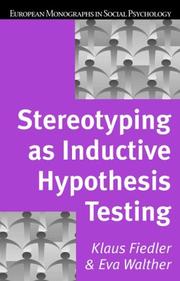| Listing 1 - 10 of 29 | << page >> |
Sort by
|

ISBN: 9781841694283 1841694282 Year: 2007 Publisher: New York Psychology press
Abstract | Keywords | Export | Availability | Bookmark
 Loading...
Loading...Choose an application
- Reference Manager
- EndNote
- RefWorks (Direct export to RefWorks)
This volume is devoted to the fascinating topic of social communication - fascinating because communication is ubiquitous, in that one cannot not communicate. And yet, the art of effective communication can be extremely demanding and elusive, because a tricky trade-off problem has to be solved. For communication to be successful, it must be at once informative - somehow indicating an intended direction of thought or action - as well as subtle - somehow concealing intentions and instrumental goals. Failure to meet the former criterion renders communication uncontrolled and haphazard; failure to meet the latter raises suspicion and reactance. The chapters in this volume focus on the tools and repertoires evolved by social communication in order to deal with this demanding trade-off. They represent prominent paradigms of current research at the interface of communication and social psychology, presented by leading scholars who have played crucial roles in the development of those paradigms. The sixteen chapters are grouped into four major sections: communication within and between groups and cultures; strategic communication; social communication, affect, and behaviour regulation; and social communication and adaptive behaviour regulation. Individual chapters are devoted to such intriguing topics as stereotypes and intergroup affairs, language and culture, deception and lie detection, persuasion, discussions in groups, logic of conversation, nonverbal cues, conversational implicatures, the impact of conversation situations and social distance, and the evolution of verbal communication. The volume is framed by an introduction and an epilog. Social Communication is essential reading for senior undergraduates, graduates, and researchers working in the field of social communication, language and social psychology, and related areas in social science such as communication science, linguistics, and gender studies.
Communication --- Interpersonal communication. --- Intergroup relations. --- Social interaction. --- Social psychology. --- Sociolinguistics. --- Communication interpersonnelle --- Relations intergroupes --- Interaction sociale --- Psychologie sociale --- Sociolinguistique --- Social aspects. --- Aspect social --- Communication interpersonnelle. --- Relations intergroupes. --- Interaction sociale. --- Psychologie sociale. --- Sociolinguistique. --- Communicatie. --- Sociale interactie. --- Interpersonale Kommunikation. --- Gruppe. --- Kommunikation. --- Aspect social. --- Intergroup relations --- Interpersonal communication --- Social interaction --- Social psychology --- Sociolinguistics --- Language and languages --- Language and society --- Society and language --- Sociology of language --- Language and culture --- Linguistics --- Sociology --- Integrational linguistics (Oxford school) --- Mass psychology --- Psychology, Social --- Human ecology --- Psychology --- Social groups --- Human interaction --- Interaction, Social --- Symbolic interaction --- Exchange theory (Sociology) --- Interpersonal relations --- Conflict, Intergroup --- Intergroup conflict --- Relations, Intergroup --- Communication and culture --- Social aspects --- Sociological aspects --- Communication - Social aspects.
Book
ISBN: 9990804036 9789990804034 9789996027031 9996027031 Year: 2015 Publisher: Mzuni [Malawi] Oxford [England] Mzuni Press Mzuni Press is represented outside Africa by African Books Collective.
Abstract | Keywords | Export | Availability | Bookmark
 Loading...
Loading...Choose an application
- Reference Manager
- EndNote
- RefWorks (Direct export to RefWorks)
The Christian faith is comprehensive and diverse, so the question, what the centre is, can be asked. Different answers have been given, to which this book adds another. The venture of the Christian faith is missions, following Kenneth Scott Latourette's thesis that the Holy Spirit moves forward the history of the church by bringing in ever new revivals, which produce ever new organisations. Therefore missions are not the children of the churches, but of the revivals, and Africa was not evangalised by the European and American churches, but by the Europeans and American mission societies.
Christianity --- Missions --- Christian missions --- Missions, Foreign --- Religion --- Theology, Practical --- Proselytizing --- History. --- Africa --- Church history.
Book
ISBN: 9996045218 9789996045219 9996045269 9789996045264 Year: 2016 Publisher: Mzuzu, [Malawi]
Abstract | Keywords | Export | Availability | Bookmark
 Loading...
Loading...Choose an application
- Reference Manager
- EndNote
- RefWorks (Direct export to RefWorks)
In this book Klaus Fiedler offers a candid critique of religious faith healing claims - a critique that extents to the Voluntary Male Medical Circumcision Campaign (VMMCC). The book reveals the lack of substantive evidence to back such healing claims and the contradiction between the VMMCC claims and the consequences of those claims in sexual health and practice.
Quacks and quackery --- AIDS (Disease) --- HIV infections --- HIV (Viruses) infections --- HTLV-III infections --- HTLV-III-LAV infections --- Human T-lymphotropic virus III infections --- Lentivirus infections --- Sexually transmitted diseases --- Acquired immune deficiency syndrome --- Acquired immunodeficiency syndrome --- Acquired immunological deficiency syndrome --- Immunological deficiency syndromes --- Virus-induced immunosuppression --- Charlatans --- Impostors and imposture --- Medicine --- Swindlers and swindling --- Alternative treatment

ISBN: 9004104976 9789004104976 Year: 1996 Publisher: Leiden: Brill,
Abstract | Keywords | Export | Availability | Bookmark
 Loading...
Loading...Choose an application
- Reference Manager
- EndNote
- RefWorks (Direct export to RefWorks)
Christianity and culture --- Missions --- Missions, English --- History
Book
ISBN: 1136872418 1283105160 9786613105165 1136872426 0203837703 Year: 2007 Publisher: New York : Psychology Press,
Abstract | Keywords | Export | Availability | Bookmark
 Loading...
Loading...Choose an application
- Reference Manager
- EndNote
- RefWorks (Direct export to RefWorks)
This volume is devoted to the fascinating topic of social communication - fascinating because communication is ubiquitous, in that one cannot not communicate. And yet, the art of effective communication can be extremely demanding and elusive, because a tricky trade-off problem has to be solved. For communication to be successful, it must be at once informative - somehow indicating an intended direction of thought or action - as well as subtle - somehow concealing intentions and instrumental goals. Failure to meet the former criterion renders communication uncontrolled and haphazard
Communication --- Interpersonal communication. --- Intergroup relations. --- Social interaction. --- Social psychology. --- Sociolinguistics. --- Social aspects.
Book
Year: 1982 Publisher: Berlin VEB Verlag Volk und Gesundheit
Abstract | Keywords | Export | Availability | Bookmark
 Loading...
Loading...Choose an application
- Reference Manager
- EndNote
- RefWorks (Direct export to RefWorks)
Book
ISBN: 9004664637 Year: 1996 Publisher: Leiden : BRILL,
Abstract | Keywords | Export | Availability | Bookmark
 Loading...
Loading...Choose an application
- Reference Manager
- EndNote
- RefWorks (Direct export to RefWorks)
The common charge laid against missionaries that they are destroyers of African culture is shown to be untrue of the missionaries treated in this book, who worked with considerable success to integrate Christianity and African culture. The author examines the endeavours of the missionaries from the perspective of the local Christians, who were not themselves interested in Africanization as such. One can thus find some missionaries defending - against the elected African Church leadership - the right of the Chagga Christians to circumcise their daughters, and Nyakyusa Christians refusing to use African tunes because the missionaries - influenced by National Socialism - professed both love for African culture and White superiority. This informative book, based on local and archival research at Daressalam University, is eminently readable. It features the first historical study of Bruno Gutmann, and provides case study material for teaching.

ISBN: 0863778321 1135471053 1280077417 0203641531 9780203641538 9786610077410 661007741X 9780863778322 9781135471057 9781135471002 1135471002 9781135471040 1135471045 9781138883093 1138883093 9781280077418 Year: 2004 Publisher: Hove (UK) ; New York : Psychology Press,
Abstract | Keywords | Export | Availability | Bookmark
 Loading...
Loading...Choose an application
- Reference Manager
- EndNote
- RefWorks (Direct export to RefWorks)
Traditional social hypotheses have a built-in tendency to verify themselves and so involuntarily resist attempts at stereotype change or correction. This is the insight demonstrated and discussed as the start point for an alternative approach to the problem of stereotyping and hypothesis testing. Stereotyping as Inductive Hypothesis Testing explicates the proposition that many stereotypes originate not so much in individual brains, but in the stimulus environment that interacts with and constitutes the social individual. This cognitive-ecological approach is then used to analyse the different aspects of language, sign systems and communication that can implicitly govern hypothesis testing procedures and lead to circular or reinforcing outcomes. The authors describe factors in tests such as judgment, memory and expectation and go on to suggest viable ecological learning approaches to them. An original research project based on a classroom situation is used to demonstrate and verify findings. The cognitive-ecological approach is then contextualised in relation to both the traditional approaches it can replace and the contemporary statistical sampling practices it can improve. Written with a profound understanding of the link between theoretical rigour and good empirical research practice this monograph will be invaluable to anyone with an interest in stereotyping or who wishes to enhance the reliability and self-awareness of their research methods.
Stereotypes (Social psychology) --- Social sciences --- Stéréotypes --- Sciences sociales --- Research --- Methodology --- Methodology. --- Recherche --- Méthodologie --- Hypothesis. --- Assumption --- Supposition --- Logic --- Reasoning --- Science --- Mental stereotypes --- Stereotype (Psychology) --- Stereotyping (Social psychology) --- Social psychology --- Attitude (Psychology) --- Rigidity (Psychology)

ISBN: 9780511614576 9780521831598 9780521539333 9780511345173 0511345178 0511614578 0521831598 0521539331 1107148529 9781107148529 1281108502 9781281108500 9786611108502 6611108505 0511566638 9780511566639 0511344430 9780511344435 051134483X 051134404X Year: 2005 Publisher: Cambridge Cambridge University Press
Abstract | Keywords | Export | Availability | Bookmark
 Loading...
Loading...Choose an application
- Reference Manager
- EndNote
- RefWorks (Direct export to RefWorks)
A 'sample' is not only a concept from statistics that has penetrated common sense but also a metaphor that has inspired much research and theorizing in current psychology. The sampling approach emphasizes the selectivity and the biases that are inherent in the samples of information input with which judges and decision makers are fed. As environmental samples are rarely random, or representative of the world as a whole, decision making calls for censorship and critical evaluation of the data given. However, even the most intelligent decision makers tend to behave like 'näive intuitive statisticians': quite sensitive to the data given but uncritical concerning the source of the data. Thus, the vicissitudes of sampling information in the environment together with the failure to monitor and control sampling effects adequately provide a key to re-interpreting findings obtained in the last two decades of research on judgment and decision making.
Human information processing. --- Cognition. --- Psychology --- Information processing, Human --- Bionics --- Information theory in psychology --- Perception --- Health Sciences --- Psychiatry & Psychology
Book
Year: 1978 Publisher: Berlin Duncker & Humblot
Abstract | Keywords | Export | Availability | Bookmark
 Loading...
Loading...Choose an application
- Reference Manager
- EndNote
- RefWorks (Direct export to RefWorks)
| Listing 1 - 10 of 29 | << page >> |
Sort by
|

 Search
Search Feedback
Feedback About UniCat
About UniCat  Help
Help News
News